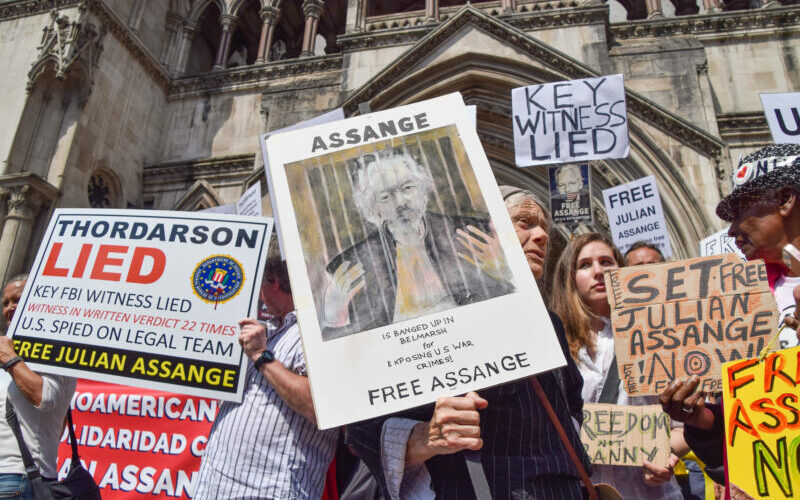Now is the time to end the dangerous threat to basic freedoms and the rule of law that the Julian Assange persecution represents. The Albanese government has a critical role to play to do everything in its power to stop the extradition and end his punishment, Greg Barns writes.
The decision last week by UK Home Secretary Priti Patel to approve the extradition to the US of Australian citizen and WikiLeaks founder Julian Assange is not surprising. Patel has swallowed the “assurances” of lawyers acting for the US that Assange would get a fair trial in a Virginia court on charges relating to his publication over 10 years ago of shocking revelations about the war crimes perpetrated by the US and its allies in the Iraq and Afghanistan wars.
But Patel’s decision drives home the need for the Albanese government to roll up its sleeves and ensure this Australian citizen does not face an effective death penalty of over 170 years in an US prison.
Unlike his Labor predecessor, Julia Gillard, and subsequent Liberal prime ministers, Albanese has rightly expressed genuine concern over the treatment of Assange. He is on the record, on a number of occasions as saying that he does “not see what purpose is served by the ongoing pursuit of Mr Assange” and, as importantly, “enough is enough”. In a statement released by Foreign Minister Penny Wong on Friday night in response to the Patel decision, she also repeated the Prime Minister’s words.
More recently, in the context of a recent media conference, Albanese indicated the Assange case was not one to be pursued by megaphone diplomacy. An interesting comment implying he is prepared to speak with US President Joe Biden about the matter, but behind closed doors.
The change in rhetoric and the sense that the Australian government might actually work assiduously to ensure that Assange, languishing with declining health in the notoriously harsh Belmarsh prison outside London, is released and allowed to rejoin his family, is welcome development. Many would like to see Albanese dial the White House today, but it is important to get the approach right before that conversation, or conversations, are had.
The Assange case will drag on in the UK courts now given the inevitability of appeals against the Patel decision and a cross appeal against rulings in the original extradition case in 2021. Meanwhile, the threat to freedom of the press and the rule of law which this case poses, remains potent.
Eminent Australian journalists such as the former Financial Times and Fairfax foreign correspondent Tony Walker, the ABC’s Kerry O’Brien and Andrew Fowler, and the former SBS’ presenter Mary Kostakidis have all been warning about how serious a threat to journalists and publishers this case really is.
Chilling effect on press freedom
If the US is successful in prosecuting an Australian journalist and publisher for letting the world know the dirty secrets of the US military machine, it will have a chilling effect on press freedom. And it will embolden other nations to follow suit. If the US can seek the arrest of a journalist who is not a citizen of that country and who has not set foot in the US, then how can it, and nations such as Australia, criticise China for enacting a law last year which allows for critics of that regime to be hunted down irrespective of where they are in the world?
From the perspective of the rule of law, the Assange case should also trouble new Attorney-General Mark Dreyfus. Extraterritorial reach of laws is generally thought to be stretching the idea that the law of a nation only applies to those who are its citizens, or who allegedly commit crimes in territory that is governed by that nation’s laws. To seek to extend the reach of domestic laws to those who have no legal connection to it by way of citizenship, residence or other ties to the jurisdiction, is anathema to the rule of law. That is the danger presented by the Assange case.
Of course, some say the Assange case must be allowed to take its course via the courts because extradition is a legal process. While that is true in the vast majority of cases this is an exceptional set of circumstances. In that sense it is like the case of David Hicks, the Australian who found himself in the torture chamber that is Guantanamo Bay facing trumped up terrorism charges. Rightly that case was resolved via the political relationship between the Howard government here and the Bush Administration because it too was a case infused with a political overlay.
Now is the time to end a dangerous threat to basic freedoms and the rule of law. The Albanese government has a critical role to play in ensuring that outcome.
Greg Barns SC is an Adviser to the Australian Assange Campaign.
A version of this article first appeared in Pearls & Irritations.
Editor’s Note: veteran investigative journalist Mark Davis was at the side of Julian Assange when Assange went public after negotiations with The Guardian and New York Times. Davis says Assange worked hard to redact the identities of US and other allied agents at risk from the Wikileaks revelations; the media orgs not so much. Why then are they off the hook while Julian Assange faces life in prison? See video in following link.
Greg Barns is the author of Rise of the Right: The War on Australia’s Liberal Values (Hardie Grant Publishing 2019).
Greg graduated BA LLB from Monash University in 1984. He has been a member of the Tasmanian Bar since 2003. He is the former National Chair of the Australian Republican Movement and a director of human rights group, Rights Australia. He has written three books on Australian politics, is a Director of the Australian Lawyers Alliance, and a member of the Australian Defence Lawyers Alliance.

